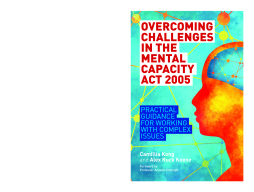
BOOK
Overcoming Challenges in the Mental Capacity Act 2005
Camillia Kong | Alex Ruck Keene | Anselm Eldergill
(2018)
Additional Information
Book Details
Abstract
This book provides mental capacity practitioners with accessible ethical guidance and applicable tools for applying the Mental Capacity Act (MCA) 2005. It shows how clients' relationships can impact their capacity in positive and negative ways, and which communication skills practitioners can use to enable and empower those with impairment. It also covers how to engage in self-reflection and transparent debate about values to improve the quality of assessments.
Helping practitioners interpret complex issues of mental capacity in the most beneficial way for clients, this book is essential reading for students and practitioners of law, medicine, mental health services and social care.
Camillia Kong is an academic researcher and philosopher based at the University of Oxford. She was awarded a British Academy Postdoctoral Fellowship to conduct research exploring the philosophical issues behind the concept of mental capacity.
Alex Ruck Keene is a barrister, writer and educator. He specialises in the Mental Capacity Act 2005, and has acted in cases involving the Act at all levels up to and including the Supreme Court.
Table of Contents
| Section Title | Page | Action | Price |
|---|---|---|---|
| Foreword by Professor Anselm Eldergill | 7 | ||
| 1. The Legal Landscape and the Challenge for Practitioners | 11 | ||
| 2. What is Autonomy? | 29 | ||
| 3. Why Relationships Matter | 51 | ||
| 4. Enabling and Disabling Narratives | 79 | ||
| 5. The Ethical Role of the Capacity and Best Interests Assessor | 97 | ||
| 6. Conclusion | 139 | ||
| Appendices | 143 | ||
| References and Further Information | 165 | ||
| Index | 171 | ||
| Blank Page |
